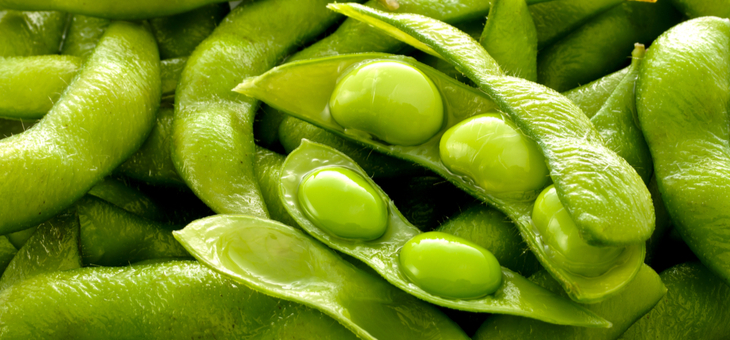Soybeans are members of the pea (legume) family of vegetables. Eating soybean-based foods may reduce the risk of a range of health problems, including coronary heart disease.
More research is needed, but the evidence so far suggests that it is wise to include whole soy (or soya) foods in your daily diet.
Soybeans contain hormone-like substances called phytoestrogens that mimic the action of the hormone oestrogen.
The health benefits of soy for menopausal women could include fewer hot flushes, protection from coronary heart disease (CHD) and lowered risk of osteoporosis.
Whole soy foods have been shown to have health benefits, but the benefits of taking phytoestrogen supplements are unproven. See your doctor or dietitian for further guidance.
Soy is a high-quality protein. It is one of only two known plant foods (the other is the Amaranth seed) to contain all the essential amino acids, similar to those found in meat.
Some soy products are sources of calcium and iron, such as Chinese tofu or tempeh (made with a calcium coagulant) and calcium-fortified soy drinks.
The soybean is:
- high in fibre
- high in protein
- low in saturated fat
- cholesterol free
- lactose free
- a good source of omega-3 fatty acids
- a source of antioxidants
- high in phytoestrogens.
Soybeans and hot flushes
Due to their phytoestrogen content, it has been thought that soy can reduce menopausal symptoms, such as hot flushes. This is due to the observation that Asian women tend to have soy-rich diets and typically have fewer hot flushes during menopause than their Western counterparts (who tend to have meat-rich diets). However, recent studies have found little effect on the symptoms of menopause from a soy-rich diet or supplement.
It is thought that a soy-rich diet helps reduce menopausal symptoms such as hot flushes, because the phytoestrogens act like a mild form of hormone replacement therapy (HRT).
Measured reductions in the rate of hot flushes associated with soy consumption vary from 1.9 per cent to 45 per cent.
More research is needed, but soybeans seem to offer promise in helping some women to manage menopausal hot flushes.
If phytoestrogens do work, studies suggest that you need at least two to three serves of soy products daily. This would mean either:
- 500ml of soy milk per day
- 100g of tofu per day
- Four to five slices of soy linseed bread per day (depending on the brand).
Soybeans and heart disease
Oestrogen may protect women against coronary heart disease (CHD) during their reproductive years, but rates of CHD increase remarkably after menopause.
Soybeans have been shown to lower total cholesterol and LDL cholesterol levels, both known risk factors for CHD.
A meta-analysis (an analysis of multiple studies on a topic) of 41 clinical trials found that 20g to 61g of soy protein can significantly reduce total blood cholesterol levels, LDL (bad) cholesterol levels and triglycerides.
The results also showed that soy protein supplements slightly increased HDL (good) cholesterol levels. This amount of soy protein is found in two to three serves of soy products.
It is not known whether the phytoestrogens or the soy proteins (or both, working in combination) or the other characteristics of soy (including high-fibre content and low saturated-fat content) are responsible for these health benefits.
However, studies have shown that eating soy protein without isoflavones results in only small cholesterol reductions, and isoflavone supplements alone have minimal cholesterol-lowering effects.
The cholesterol-lowering benefits of eating soy foods may be improved if the total diet is high in carbohydrates. This seems to help with the breakdown of the isoflavones.
In 1999, the United States Food and Drug Administration acknowledged the heart health benefits of including at least 25g soy protein daily in a diet low in saturated fat and cholesterol. This equates to approximately four servings of soy daily.
Other health benefits of soy
Possible health benefits of whole soy foods not already mentioned include:
- lowered blood pressure
- improvements to blood vessels, such as greater elasticity of artery walls
- reduced risk of osteoporosis
- protection against various cancers, including those of the breast, colon, prostate and skin
- management of endometriosis
- anti-inflammatory effects.
For more information, visit betterhealth.vic.gov.au
How much soy do you have in your diet? Have you started eating more since menopause?
If you enjoy our content, don’t keep it to yourself. Share our free eNews with your friends and encourage them to sign up.

